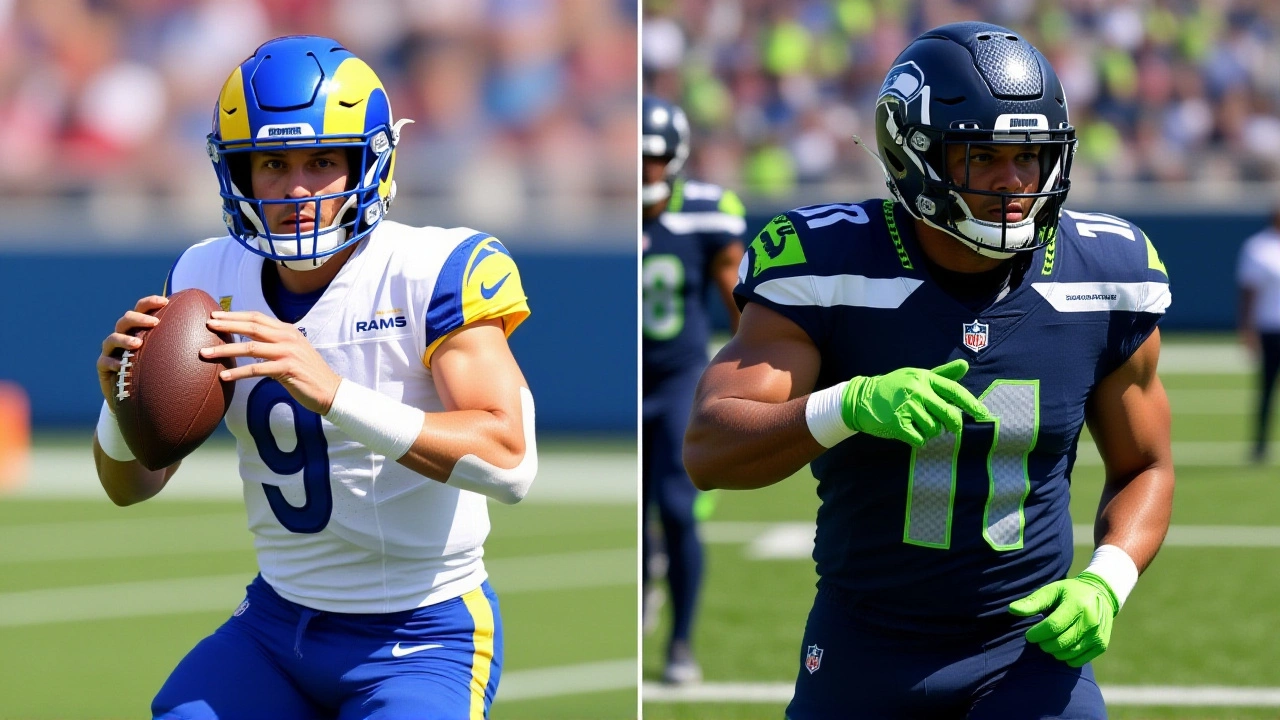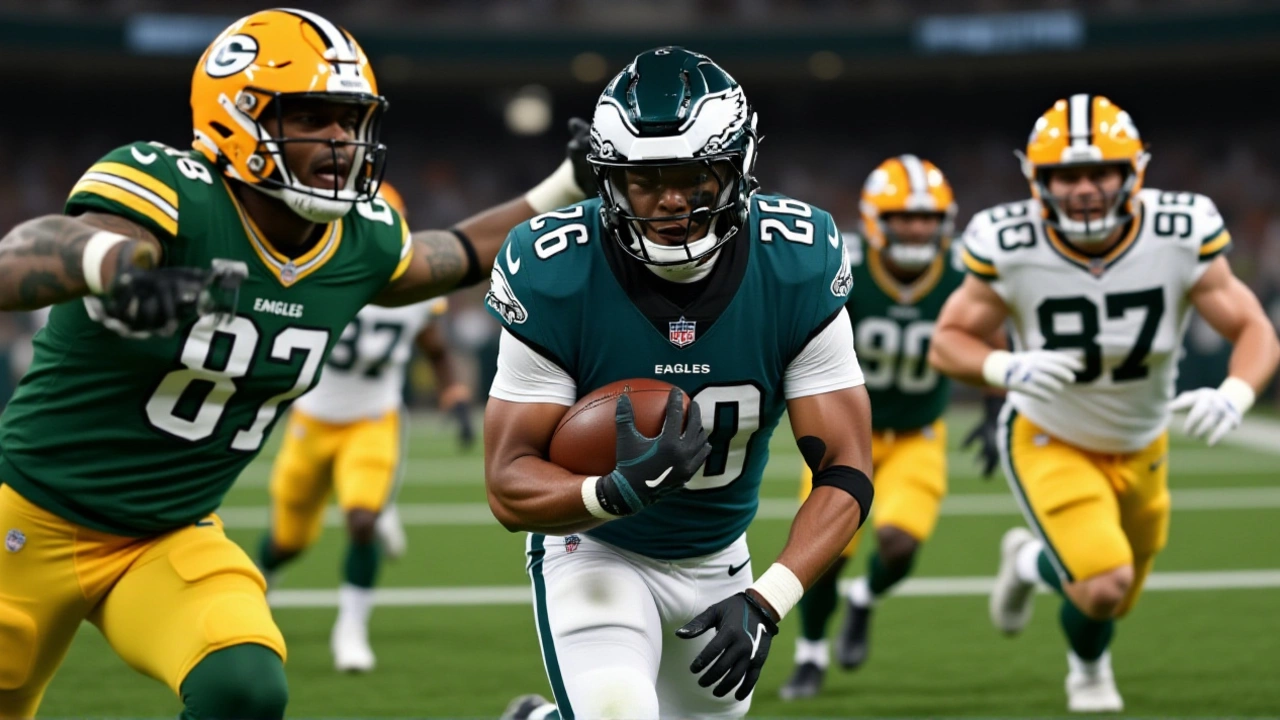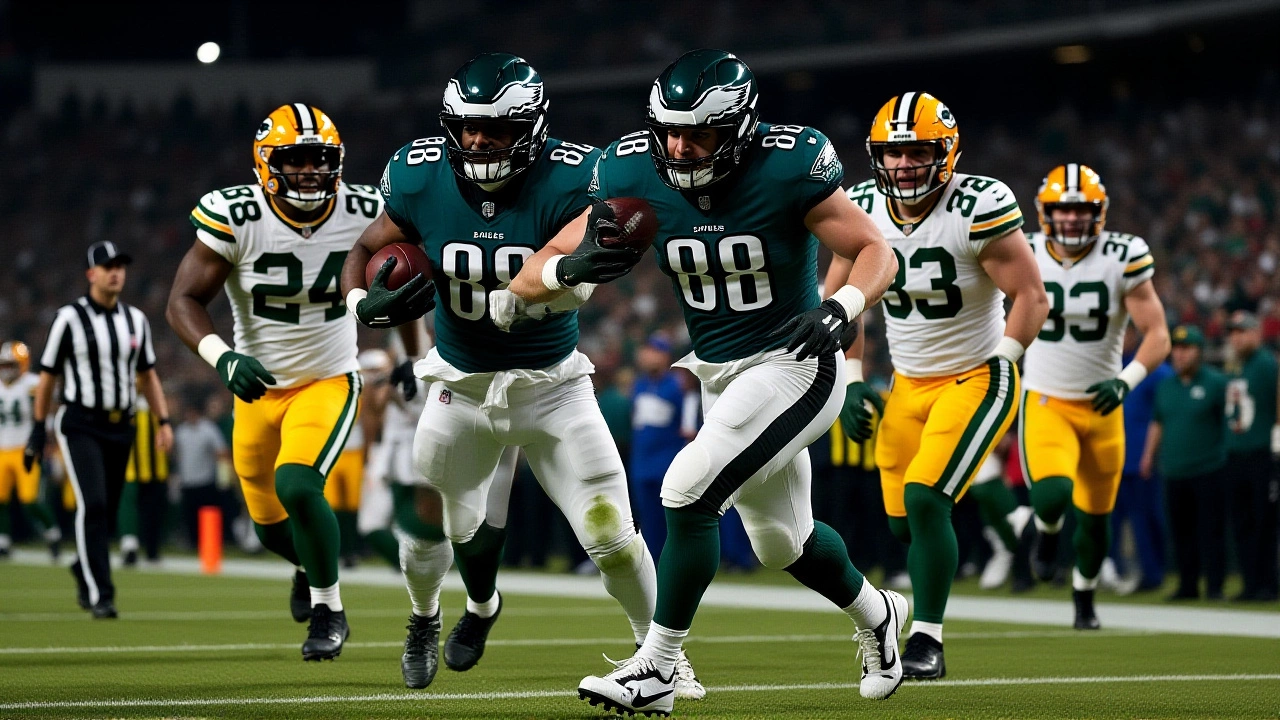The Philadelphia Eagles pulled off a gritty, unexpected 10-7 victory over the Green Bay Packers on Monday Night Football, November 10, 2025, at Lambeau Field — a game that defied odds, expectations, and nearly every betting line. With the final whistle, the Eagles improved to 7-2 on the season, while the Packers slipped to 5-3-1, their first home loss in nearly two months. What made this game unforgettable wasn’t the scoring — it was the silence. No fireworks. No big plays. Just two defenses playing chess with a football.
Defensive Dominance Over Offensive Fireworks
For a game with a 45.5-point over/under set by nearly every major sportsbook, the final total of 17 points was a shock. The Eagles scored their only touchdown on a 12-play, 68-yard drive in the fourth quarter, capped by a 2-yard rush from Saquon Barkley. Their other points came from a 37-yard field goal by Jake Elliott in the third. The Packers, meanwhile, managed just one score: a 4-yard touchdown pass from Jordan Love to Romeo Doubs late in the fourth, after a 14-play drive that chewed up 7:32 of clock. Neither offense looked comfortable. The Eagles’ offensive line, battered all season, held firm. The Packers’ line, already thin after injuries, surrendered five pressures in the second half alone.
Here’s the twist: before kickoff, ESPN Analytics gave the Packers a 52% win probability — higher than the Eagles’ 47.6%. That’s because Green Bay’s home record (3-1-1) and history at Lambeau had fans and algorithms believing in the underdog narrative. But the Eagles didn’t need to be favorites. They just needed to be better when it mattered.
Betting Lines Shifted — But the Outcome Didn’t Surprise Everyone
The betting market was all over the place. FanDuel opened with Packers -1.5 (-110). DraftKings had Eagles +1.5 (-120). Caesars went pick’em. ESPNBet offered Packers -1.5 (-100). The inconsistency reflected genuine uncertainty — and opportunity.
Winners and Whiners nailed it. Their prediction? Eagles PK (2 Units) and Under 45.5 (3 Units). “Taking the Eagles in a pick’em spot makes plenty of sense,” they wrote. “Jalen Hurts has been efficient both through the air and on the ground. And with Saquon Barkley running behind a strong offensive line, Philadelphia has the ability to control tempo in multiple ways.” They weren’t wrong. Hurts completed 18 of 26 passes for 157 yards and zero interceptions. He rushed seven times for 31 yards — including a crucial 11-yard scramble on the final drive.
Defensively, the Eagles’ new pieces clicked. Jaelan Phillips had two sacks and forced a fumble. Jaire Alexander held Christian Watson to just two catches for 19 yards. Meanwhile, Green Bay’s defensive line — anchored by Rashan Gary — managed only one sack and zero quarterback hits after the first quarter. The Packers’ defense, usually a strength, looked slow, disjointed, and out of sync.

Why This Win Matters More Than the Record
The Eagles weren’t supposed to win here. Not on the road. Not against a team with home-field advantage. Not with the Packers’ defense showing flashes of brilliance in their last two games. But this win was a statement. It wasn’t about style. It was about substance. The Eagles have now won four straight away games — all by seven points or fewer. That’s not luck. That’s discipline. That’s execution under pressure.
For the Packers, this loss stings. They entered the game as one of the NFL’s most improved teams since Week 5. Their offense, led by Josh Jacobs (112 yards on 25 carries), looked poised to break out. But they couldn’t finish. Three red zone trips. One touchdown. Two field goals missed — one by Anders Carlson in the second quarter, another blocked by Isaiah Wynn in the third. Those are the kind of plays that haunt teams.
And then there’s the clock. The Eagles controlled possession for 37 minutes, 12 seconds. Green Bay had the ball for just 22:48. That’s not just a stat — it’s a strategy. And it’s one the Eagles have mastered under Nick Sirianni.

What’s Next? Eagles on a Roll, Packers in Crisis
Philadelphia heads into their Week 11 bye at 7-2, with the NFC East within reach. Their next three opponents — the Giants, Commanders, and Cowboys — are all winnable. But the real test? The Eagles’ ability to stay healthy. Dallas Goedert left the game in the third quarter with a shoulder injury. If he’s out for more than a week, the offense loses its most reliable red-zone target.
For Green Bay, the road gets harder. They’re now 1-2 in their last three games, and their schedule doesn’t get easier: home against the 49ers, then a trip to Seattle. With Love still developing and the offensive line struggling, the Packers may need to make a midseason pivot — perhaps giving more snaps to rookie Dontayvion Wicks or moving Christian Watson into the slot.
One thing’s clear: the Eagles aren’t just winning games. They’re winning the mental game. They don’t need 30 points. They just need one more stop.
Frequently Asked Questions
How did the Eagles’ defense manage to shut down Green Bay’s offense despite the Packers’ strong home record?
The Eagles’ defense succeeded by mixing pressure with disciplined coverage. Jaelan Phillips and the front seven disrupted Jordan Love’s timing, forcing him into quick throws. Meanwhile, Jaire Alexander and the secondary played tight, bump-and-run coverage on Romeo Doubs and Christian Watson, denying deep routes. Green Bay’s offensive line, already weakened by injuries, couldn’t sustain blocks for more than three seconds, leading to three three-and-outs in the second half.
Why did the betting lines vary so much between sportsbooks for this game?
The variation reflected conflicting data: Green Bay’s strong home record (3-1-1) clashed with Philadelphia’s road resilience (4-1) and defensive upgrades. Caesars and DraftKings saw the Eagles as undervalued, while FanDuel and ESPNBet leaned on Lambeau’s historical advantage. The final consensus — a pick’em — showed oddsmakers recognized the matchup was too close to call, making it a classic “trap game” scenario.
Did the Under 45.5 bet pay off, and why was it such a smart play?
Absolutely. The final score of 17 points was nearly 30 points under the total. Both teams had elite defenses but inconsistent offenses. Philadelphia’s offense relied on clock control, not big plays. Green Bay’s offense struggled to generate explosive drives, especially without Davante Adams. The Under was a high-probability bet because neither team had a true game-breaking playmaker on the day — and both defenses forced turnovers and stalled drives.
What impact did Jalen Hurts’ performance have on the outcome?
Hurts didn’t need to be spectacular — he just needed to be smart. His 157 passing yards were modest, but he managed the game perfectly: no turnovers, no panic, no forced throws. His 31 rushing yards, including a key 11-yard scramble on the final drive, kept the chains moving and drained the clock. In a low-scoring game, his poise under pressure was the difference between a win and a loss.
How did the Eagles’ recent roster additions influence the game?
Jaelan Phillips, acquired in the offseason, was a game-changer — his two sacks and forced fumble disrupted Green Bay’s rhythm. Jaire Alexander, signed in free agency, neutralized Christian Watson, one of the Packers’ top deep threats. These weren’t just upgrades — they were identity shifts. The Eagles went from a pass-rush-heavy unit to a balanced, versatile defense capable of winning both in the trenches and in coverage.
What does this loss mean for the Packers’ playoff chances?
Green Bay’s playoff hopes are now hanging by a thread. At 5-3-1, they’re tied for second in the NFC North, but their schedule gets brutal: 49ers, Seahawks, Lions, and Vikings remain. They’ve lost two of their last three games by a combined 10 points. Without more offensive consistency and better red-zone execution, they’ll need to win at least four of their final five games — a tall order without a reliable passing game.
